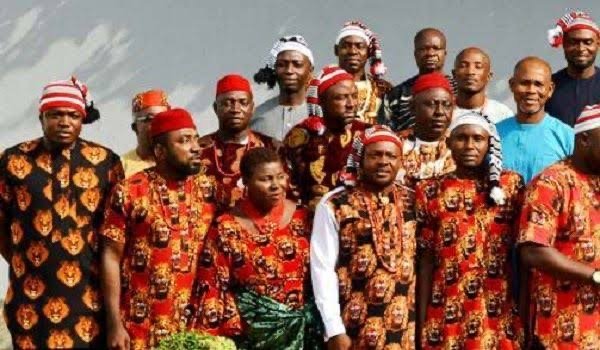Why Igbos Prefer First Owning Residential Properties In Their Hometowns

A residential building in Eastern Nigeria
Nigeria is a country that consists of diverse ethnic groups. These groups have coexisted for many years and have made significant contributions to the country's advancement and economic development. Each ethnic group has its own unique culture and social behavior, which allows members of society to identify and interact with them easily. One of the most prominent ethnic groups in Nigeria are the Igbos, and their unique practice of prioritising owning assets like residential properties in their hometowns caught my attention.

People of the igbo ethnic group
The Igbos originate from the southeastern region of Nigeria and are one of the country's largest ethnic groups. They speak the Igbo language, which is interesting in itself. The Igbos are well-known for their adventurous spirit, industriousness, and acumen for commerce and trade. Consequently, they have a large pool of entrepreneurs and business owners in the country, making them a significant player in the world of commerce and trade. Their enterprising nature has made many of them successful in their respective vocations, and they have also empowered their fellow kinsmen with the secrets of their success, increasing the commonwealth of the Igbos as a whole.
Despite my admiration for the ingenuity and success of the Igbos in their vocations, I noticed a peculiar pattern of behavior among them. A large number of Igbos migrate from their hometowns to other parts of Nigeria to engage in various vocations, with trade and commerce being the most common. They aim to earn a living and become financially empowered, which they achieve over time. However, when it comes to owning assets like residential properties, I observed that the Igbos prefer to own their first properties in their hometowns rather than in the states where they reside. I found this practice to be strange and different from what I believed to be a prudent financial and economic decision, that is, owing houses in one's state of residence.
My curiosity led me to inquire about why the Igbos adopted this practice. After much observation and inquiry, I discovered that it was related to an incident that happened in the past. A few years after Nigeria gained independence and became a sovereign state, a civil war broke out in the country. The war was triggered by what was perceived to be a genocide of Igbos in the Northern region of the country, which was caused by the crisis in the military government. The then Governor of the Eastern region, who was an Igbo, pronounced the secession of the region from Nigeria, but the military government opposed it, leading to a civil war.
The war caused significant loss of lives and properties, with the Igbos being the major casualties. Most of them who had their source of livelihood and properties in other regions of the country either got dispossessed or had them destroyed. They were also antagonized in these regions, leading to a mass exodus of the group to their hometowns. The deprivation of assets belonging to the Igbos during the war plunged them into economic and financial hardship, isolating and impoverishing the Eastern region of Nigeria and its predominantly Igbo population.
After the war, the Igbos had a fresh start, which they utilized fully to recover and exceed the losses they suffered. They made impressive progress during this period and reclaimed dominance in the commercial and trading sector of the local economy. However, the experience of loss suffered by the people during the war made them reorder their priorities. Unlike in the past, when the Igbos owned residential properties wherever they resided, the experience of the civil war made them prioritize making such investments in their hometowns instead. The Igbos considered this practice to be discerning and an effective way to secure their assets in the eventuality of an incident similar to the civil war.
Learning about the history and reasons behind the Igbos' practice of preferring to own assets like houses in their hometowns rather than where they reside was an enlightening experience for me. My curiosity got satisfied and I also gained insight on the matter. All of these have made me appreciate the rationale behind the Igbos preference of first owning assets in their hometowns than anywhere else. There is always a reason for every decision!
Thanks for reading,
See you on the next one guys.
all image source added in photo caption

This post has been manually curated by @bhattg from Indiaunited community. Join us on our Discord Server.
Do you know that you can earn a passive income by delegating to @indiaunited. We share more than 100 % of the curation rewards with the delegators in the form of IUC tokens. HP delegators and IUC token holders also get upto 20% additional vote weight.
Here are some handy links for delegations: 100HP, 250HP, 500HP, 1000HP.
100% of the rewards from this comment goes to the curator for their manual curation efforts. Please encourage the curator @bhattg by upvoting this comment and support the community by voting the posts made by @indiaunited..
This post received an extra 4.41% vote for delegating HP / holding IUC tokens.
Thank you IU community
Stopping by to let you know we have a community called Cross Culture, where similar topics would fit better. Check it out and join if you're planning to write similar posts.
OCD community is for topics that don't fit in any other community and should be used when you don't find a niche community for your post.
Here's a guide I put together to help you learn about how communities work and why you should use them -> Communities Explained - Newbie Guide. I also put together a list of communities, which is not complete, there are much more communities on Hive, but it will help you get started.
Once you posted your post in the right community, you can then cross post it to OCD community. Here's a guide about cross posting.
Please don't delete any post with the purpose of reposting it in another community as that can be considered abuse. Leave this post here, you'll get it right next time.
Alright, thank you
Duly noted ❤️
@udezee A people that fights to remain firm and rooted to its cultures, no one can defeat it. United they all advance.